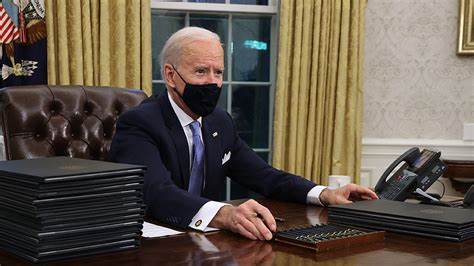With another federal oil and gas drilling moratorium looming, fewer pundits are accusing the government of picking winners and losers – because it’s difficult to see any winners. It seems more like the old grade school trick of “heads I win, tails you lose.” The larger question should be, how in the world did the American people ever grant such power – the power to destroy thousands of jobs and devastate western economies – to any one individual?
Of course, they didn’t. Some might argue that elections are policy decisions, with consequences. On the other hand, no candidate ran on a platform of ignoring the legislative process, and governing the country by edicts and decrees. In the U.S. we call them executive orders, an extra-constitutional process that has evolved over time.
Today Americans are embroiled in a bewildering array of political arguments, from immigration to vaccine administration, stemming from executive orders, several of them repealing previous executive orders. One of the most onerous, for Colorado, is the pending ban on public lands of oil and gas leases. It is contrary to properly enacted laws, and to land management plans duly adopted through a carefully defined legal process. But that does not make the ban any less real for the West. Drilling on federal lands yielded $1.8 billion directly to states in 2020, supporting schools and numerous conservation programs.
New Mexico is the largest recipient of drilling revenues from federal lands, which comprise almost a third of that state. Royalties in New Mexico increased 85 percent in the last ten years, to $707 million in 2020 – ten percent of the entire state budget, most of it spent on schools. How might schools replace those funds? In Colorado, it is uncertain how the legislature would fund the Water Conservation Board, the Oil and Gas Commission, and numerous other natural resources programs currently funded by oil and gas revenues.

Even members of President Biden’s own party are raising concerns over a leasing ban. New Mexico Senators Martin Heinrich and Ben Ray Lujan, both Democrats, oppose the ban. “An extended and indefinite suspension would have significant impacts on our workforce and state funding for education, and creates unnecessary uncertainty for… state and local tax revenues,” they wrote. Colorado’s senators should make clear that a ban would have dire consequences in their state, too.
An analysis by OnLocation, using the same software used by the Energy Department, showed that a ban on public land leasing would cost the U.S. 68 percent of its natural gas production and 44 percent of its oil development by 2030, causing a $700 billion decline in the gross domestic product, and risking more than $9 billion in government revenue. A University of Wyoming report shows that lost wages would total $19.6 billion, economic activity would decline $43.8 billion, and tax revenues would drop $10.8 billion in Alaska, California, Colorado, Montana, New Mexico, North Dakota, Utah and Wyoming – without their elected representatives ever voting on it.
Government by executive orders evolved for one reason. Nobody stopped it. Courts occasionally rein it in, as when the Supreme Court twice voided Clinton executive orders that were unauthorized by law. Congress has clipped the executive branch’s wings, too, as with passage of the 1973 War Powers Act, overriding a presidential veto, restricting a president’s power to commit troops without congressional approval. The next year it passed the Budget Impoundment and Control Act of 1974, requiring presidents to spend appropriated money, whether they want to or not. Congress’s message was: we make the laws, and we expect you to implement them.
Congress has often reserved to itself the power to set rules for managing public lands. The Wilderness Act explicitly granted only Congress the right to set aside wilderness. Other public lands are managed for multiple uses under the law, within guidelines set by Congress. But if a president can reserve lands in other categories, say new national monuments, and ban uses such as energy production, has he not created de-facto wilderness areas?
If a president can by executive order ban a use of public lands that is explicitly authorized by law, has he not usurped legislative power, rather than “ take care that the laws be faithfully executed,” as the Constitution requires? That document says if he wants to change laws, he asks Congress, and in an emergency, convenes a special session. Or can he just act unilaterally, ignoring laws he doesn’t agree with?
It is not just an abstract legal question. It is the livelihood of thousands.




Comments on this entry are closed.